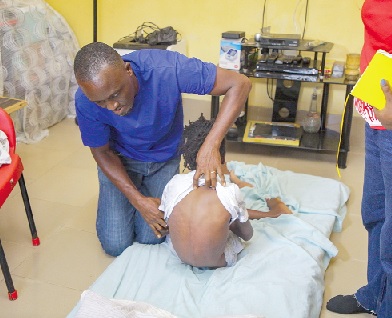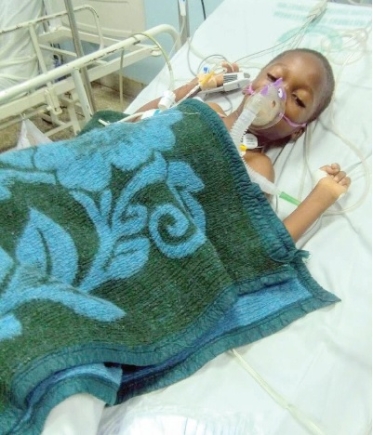A father’s hurdles caring for son with Sickle Cell disease
Like most first-time fathers, Mr John Dzido was excited when his son Caleb was born in 2008. He was also happy that his first child was a boy and couldn’t wait for him to grow up so they embarked on “boys boys” adventures.
“I was happy. It is every man's joy to have his first child as a son. So I was very happy when he came looking very handsome. I felt the whole world had been given to me,” he told The Mirror in an interview in Accra last Tuesday.
This joy, however, was short-lived when at 18 months, Caleb was diagnosed with HbSS (Sickle Cell anaemia), the most common and severe type of sickle-cell disease (SCD).
At age three, he suffered a stroke and has over the years endured multiple strokes, seizures, surgeries, blood transfusions, iron overload management, and recurrent infections.
Mr Dzido, who has been his primary caregiver since his diagnosis, has spent the last 14 years in and out of hospitals with Caleb while Caleb fights for his life through different treatments, procedures and medications.
The 17-year-old is bedridden and depends mainly on his father as his condition has been complicated by cognitive and motor function impairment, spasticity in all limbs (stiff arms and legs), and many other health challenges.
“You have to do everything for him, feed him, bathe him. Before I go out, I have to make sure he is supported to use a chamber pot and give him his medications. He has had several medical interventions, especially on his hips.
“When I am away, they find it difficult to handle him because there is an implant on the right side of his thigh, which you can feel from outside. So they feel that if they don't handle him well, they may end up hurting him,” Mr Dzido said.
Knowledge of sickle cell genotype
Mr Dzido explained that he and his ex-wife (Caleb’s mother) did not know their sickle cell genotype until their children were diagnosed with SCD.
Unknown to them, while he, ( Mr Dzido) was a carrier, his partner then had lived all her life with an undiagnosed sickle-cell disease.
“She had occasional pains and minor health challenges but never knew she had the disease until Caleb was diagnosed when we all had to get checked,” he explained.

Aside from Caleb, their second child, a girl also lives with the disease but she has not experienced any crisis or suffered any of the conditions Caleb continues to navigate.
“We had no idea about SCD until he was born, and I think he started showing signs of dactylitis, which is a painful swelling of fingers and toes, after six months, we still did not know until when he was 18 months old.
He had a very high temperature and then we rushed him to the SSNIT Hospital at Osu in Accra, and it was there that they discovered he had the disease and had his first blood transfusion. When we were discharged we were referred to the Korle Bu Teaching Hospital for better management,” he explained.
Primary caregiver
Mr Dzido said he and Caleb had had a special bond since he was born and was the one who took him to the hospital when he started showing symptoms of the disease before he was diagnosed.
Along the line, when he and his ex-wife separated, he was the best person to take care of Caleb as he better understood his complications and knew the team of experts who were managing his condition.
His partner, he said, opted to be given custody of their daughter but they were advised that it was best that the two children lived together. Mr Dzido was then given custody of the children and their mother, access.
Difficult journey
Mr Dzido said Caleb had also developed extensive blood vessel damage due to the repeated strokes.
When The Mirror team visited their home at La in Accra last Tuesday, he (Caleb) was lying supine on a student’s mattress in their living room.
Occasionally, he is assisted by either his father or his little sister and their stepmother, Mabel, to sit in a wheelchair.
Due to his condition, he has to be supported with a chest strap so he can sit well.
Although his speech is not clear, he was able to give simple answers like mentioning banku and pepper as his favourite food, where he gets his hair braided and his hopes of going to school and becoming a medical doctor in the future.
Mr Dzido seemed to maintain a good demeanour and smiled throughout the conversation but he couldn’t help the occasional tears that filled his eyes as he recounted their journey.
“It's been a very difficult journey, combining work with hospital visits all geared towards making sure that Caleb survives. He didn't bring himself into this world, I brought him into the world and I'm not sure if he understands why he's like this, so I have to be there to hold his hand to make sure that he survives,” he said.

His frequent absence from work to cater for Caleb either at home or at the hospital has resulted in him being laid off several times.
“My last job was with the Sickle Cell Foundation of Ghana, I was employed between 2000 and 2003. When the founder passed away, it affected the operations of the foundation and we were laid off again in June 2023,” he said.
Currently, he struggles to buy and resell online or do follow-ups to jobs that would not require him to work full-time.
Sickle cell awareness
Mr Dzido is an advocate for SCD. He shares his family’s predicament hoping that others, especially young people, will know their genotype before deciding to have children.
“When you fall in love, you have to test so that you don't burden the unborn child. What I would have done differently is to make sure I married a compatible partner, which meant testing to know my genotype and my would-be partner’s. SCD is a lifelong condition and for you to have a healthy family, you need to test."
"I thought we were both healthy and unfortunately, sickle cell is not written on foreheads to indicate that this person is a carrier or has the disease,” he advised.
Financial struggles and appeal
Mr Dzido’s meagre income from occasional online sales is not enough to support his family and cater for Caleb’s medication and treatment.
His wife, Mabel, supports the family with proceeds from the sale of “Abelewas” (ice cream) but that is also not enough.
With their rent almost due, he spends most of his time moving from companies and suppliers hoping to get goods on credit to sell.
“Our main challenge has to do with money because everything about SCD revolves around money. You have to buy this; you have to buy that.
This orthopaedic plate (showing a metallic object) was embedded in Caleb's skin in 2016 but failed to provide the desired result and he had to go back to the theatre for another operation. The cost of this plate alone is about GH¢23,000.
“The range of his medications cost between GH¢30 to GH¢44,000. We need to raise GH¢44,000 for the prescribed injections that he needs to be able to relax his muscles.
So we are reaching out to everyone to support us, and to provide the care that Caleb needs to be able to survive and thrive.
Caleb’s condition is complicated and requires many treatment procedures, as well as specialised home care and his father is dedicated to ensuring that he gives him the best care possible.
“He was my best friend and we went out together until he found himself in this condition. But the condition has not affected our bond. We are still together and I have promised to be there for him and hold his hand until he becomes functionally independent. That has been our journey for the past 14 years, very difficult, yet rewarding,” he said.
Writer’s email: efiaamoakoa2@gmail.com
